What are you waiting for?
Cross-posted from Always Learning
About a year ago I started noticing a specific trend in my conversations. From the #coachbetter podcast, to coaching calls for The Coach microcredential, to conversations in our Private Mentoring program, I kept hearing a similar message from the female educators I was talking to. Although many were in a position of influential leadership, mostly as coaches, they were consistently expressing interest in formal leadership, but they didn’t feel “ready”.
These are outstanding, engaged and passionate educators who have chosen to spend extensive time (and often their own funds) on long term, deep and meaningful professional learning, beyond what is provided by their school. These are educators who are always working towards improving their craft, and who have demonstrated leadership capacity in many ways: from their own classroom, to their coaching, to their sharing learning in professional forums and events. But these women all felt like they need “more” to be able to really take that next step in their professional journey.
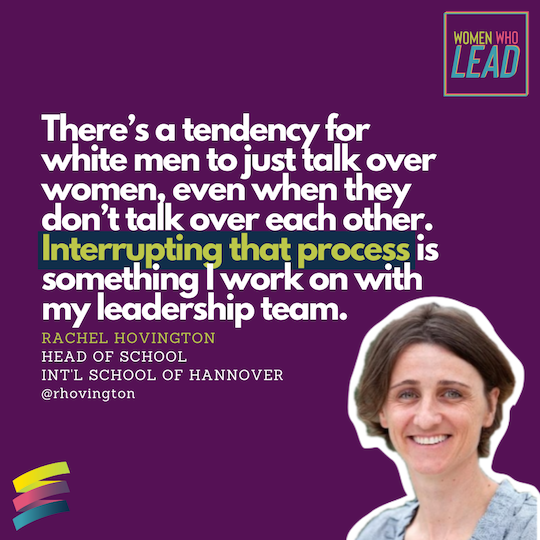
Those conversations sparked a question for me, “why do so many articulate, professional, experienced female educators think they aren’t ready for leadership?” That wondering ultimately snowballed into a series of follow-up conversations with women around the world about their leadership journeys, and I realized this feeling of “not being ready” is much more common than I thought. You’ve probably heard of “impostor syndrome“, maybe you feel it yourself in certain situations, I know I do.
As I started thinking about this struggle, and having conversations with the Eduro team about this common message I was hearing, an idea began to form. What is it about leadership that is so intimidating? And when we see successful leaders doing their job, why do so many women feel that’s not attainable for them? Maybe if we could shed some light on the personal journey, and personal stories of successful leaders, we could inspire and empower other women to take the leap into leadership themselves.
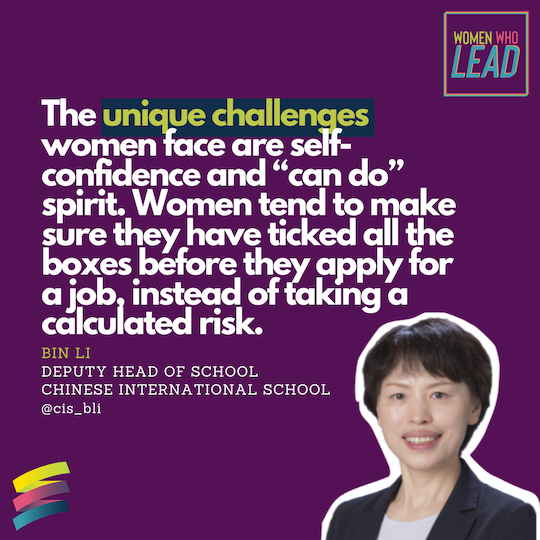
That became the beginning of the Women Who Lead project. I thought I would interview, maybe 10-12 successful women leaders in education and pull together those conversations into an online course for aspiring leaders. I reached out within my network, and started with the amazing Kathleen Naglee, Head of School at the International School Helsinki. At the end of each call, I asked for the name of another inspiring woman leader who might be interested in sharing their story. Every conversation ended up with more than just one name.
I had no idea that I would end up interviewing over 70 women, over six months, during the COVID-19 pandemic when so many of us were trapped at home, figuring out Zoom and learning that we can, in fact, having meaningful conversations over video chat. One connection led to another, and by the time I was on to my 50th call, I was starting to reach well beyond my own personal network. In addition to established leaders within the international school circuit, I was able to connect with successful female leaders in local and private schools around the world, women I would likely not have crossed paths with, and who had amazing and inspiring stories to share.
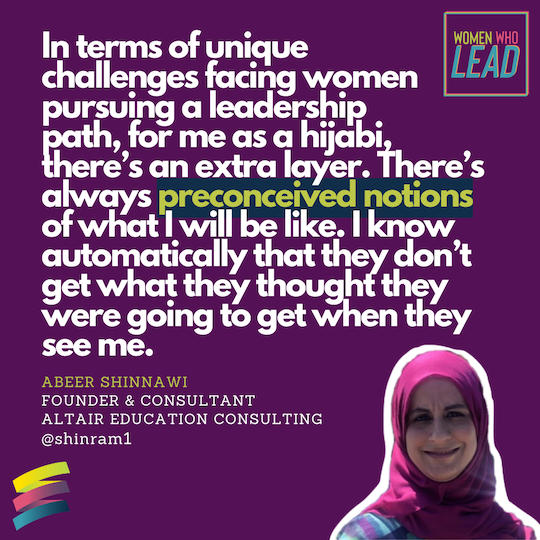
One foundational element of this project was to ensure that these conversations were intentionally inclusive. I purposefully reached out to women of color, non-native English speakers, and LGBTQI+ educators. Hearing the stories of non-white, non-heteronormative, educators was one of the most valuable aspects of this experience for me. Taking the time to better understand intersectionality in a leadership journey is not only beneficial for aspiring leaders, but for those who are currently leading.
From these conversations emerged a number of trends, highlights and key takeaways that I knew would be highly valuable and relevant for other aspiring leaders. And because I now had so much more content than I was originally expecting, I knew I had to do something powerful with it. There was so much learning in these calls, I feel like I’ve been given a masterclass in leadership and I absolutely want to share that with others.
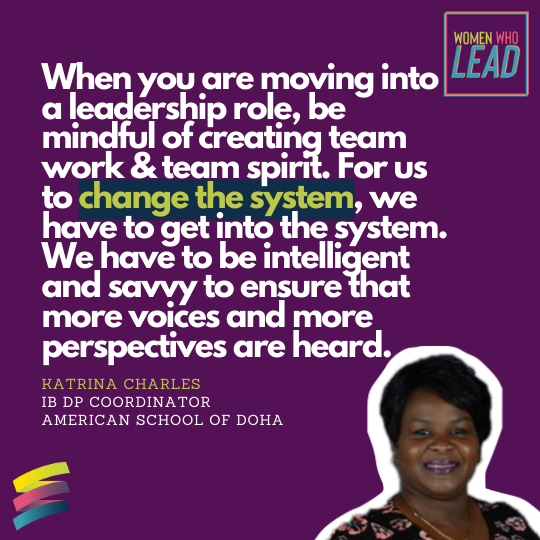
So, over the past 3 months, I’ve been building the Women Who Lead online course program. Inside the course content is curated into the 8 key themes I interviewed the women about, including:
- 1. Welcome: Beginning Your Journey
- 2. Recognizing Your Potential as a Leader
- 3. Exploring the Unique Challenges Women Face in Pursuing a Leadership Position
- 4. Interviewing for a Leadership Position
- 5. Handling Confrontation as a Leader Who Identifies as a Woman
- 6. Finding a Sense of Balance
- 7. Finding Focus and Priorities as a Busy Leader
- 8. Emerging Skills for Leaders Who Identify as Women
For each theme, I’ve included:
- – an introductory video from me, highlighting my key learnings and the key content for each theme based on all of the content within the program.
- – all 70+ interviews, edited so that you can hear the responses from each woman, one after another, to the questions I asked, allowing you to get a variety of perspectives on the same topic. Each curated list is organized by the role of the interviewee – meet them here and hear their Journey to Leadership: Head of School, Principal, K12 Director, Consultant. You could choose to watch just one strand, or watch them all. I promise, they’re all fascinating!
- – highly curated content that I researched and compiled based on the conversations I had (and quite a few recommendations from the women themselves, including an extensive reading list).
- – a practical (but not overwhelming) reflective task to help you move forward on your journey to leadership, many also inspired by strategies these amazing women have shared.
What I love about this program is that we are sharing the personal journeys of women who lead – from their perspective, with their words, and from a personal viewpoint. When we see successful women leaders, we often put them up on a pedestal and can’t imagine any challenge or struggle in their pathway. These conversations demonstrate that we are all always learning, and that now is the time to identify and start your journey to leadership.
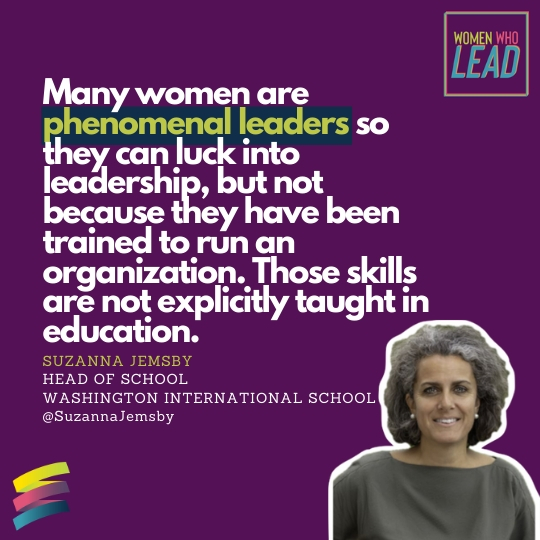
It took 7 months to conduct and edit interviews with over 70 amazing women leaders in education from around the world; research and curate content aligned with the stories these women shared; and to design the online course to create a reflective personal learning journey for each participant to be informed by the advice and experience of the women interviewed.
Four (of many) key messages emerged in these conversations:
- 1. Many women were “tapped on the shoulder” for leadership opportunities when they may not have seen leadership within themselves (yet).
- 2. Despite their varied experience and backgrounds, there are many common strategies and practices, shared by these leaders, that you can learn and apply to make your pathway as purposeful as possible.
- 3. Understanding the additional elements (often barriers) added by intersectionality is essential for all aspiring (and current) leaders.
- 4. We all need to do more to support aspiring leaders within our organizations.
Women Who Lead is also supporting two scholarship applicants dedicated to diversity equity and inclusion in their leadership practice.
The Women Who Lead program is now open for registration – and for a limited time, offered at an introductory rate.
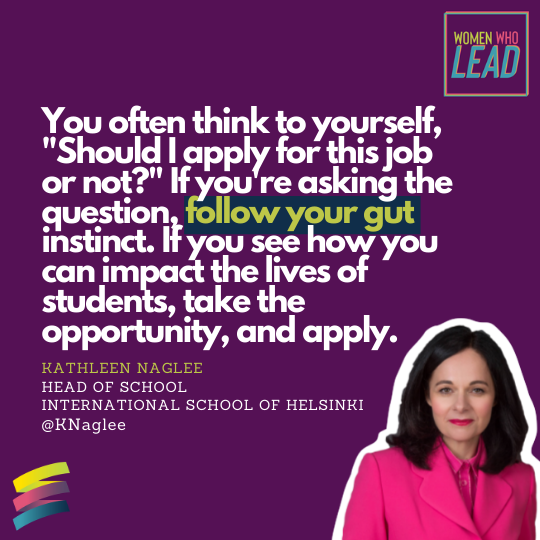
Is this the year that YOU take the next step in your leadership journey? Or is this a chance to support an aspiring leader within your organization? What are you waiting for?